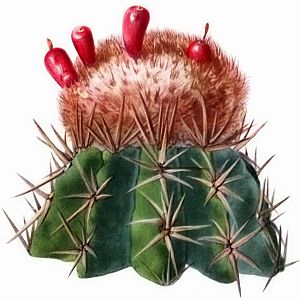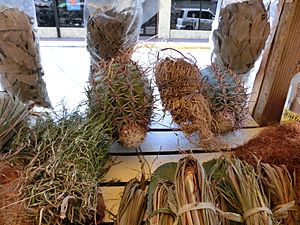Melocactus lemairei facts for kids
Quick facts for kids Melocactus lemairei |
|
|---|---|
 |
|
| Conservation status | |
| Scientific classification |
|
| Kingdom: | Plantae |
| Clade: | Tracheophytes |
| Clade: | Angiosperms |
| Clade: | Eudicots |
| Order: | Caryophyllales |
| Family: | Cactaceae |
| Subfamily: | Cactoideae |
| Genus: | Melocactus |
| Species: |
M. lemairei
|
| Binomial name | |
| Melocactus lemairei (Monv. ex Lem.) Miq. ex Lem.
|
|
| Script error: The function "autoWithCaption" does not exist. | |
| Synonyms | |
|
|
Script error: No such module "Check for conflicting parameters".
The Melocactus lemairei is a special type of cactus that only grows on the Caribbean island of Hispaniola. This island is split into two countries: the Dominican Republic and Haiti. This cactus was named after Charles Antoine Lemaire, a French expert who studied cacti.
Contents
About This Cactus
What Does It Look Like?
The Melocactus lemairei cactus is usually green and shaped like a cylinder or a slight pyramid. It can grow up to 20 cm (about 8 inches) tall. It can also be quite wide, reaching 20 to 30 cm (about 8 to 12 inches) across.
This cactus has 9 to 10 ribs, which are like the raised sections you see on its body. Each rib has 8 to 10 spines. These spines are yellow or brown and can be 2 to 3 cm (about 1 inch) long.
At the top of the cactus, it has a special part called a cephalium. This part is brown and looks like it's covered in white wool and stiff bristles, like tiny thorns. The cephalium can grow up to 10 cm (about 4 inches) tall.
Flowers and Fruits
The flowers of the Melocactus lemairei are pink. They are about 2 cm long and 1.5 cm wide. These flowers stick out about 1.2 cm from the cephalium. After the flowers, the cactus produces pink fruits that are also about 2 cm long.
Where It Lives
Distribution and Habitat
The Melocactus lemairei cactus is found only on the island of Hispaniola. It prefers to grow in dry, rocky areas. You can also find it in places that are a bit more humid, like small dips in the land. It even grows on sea cliffs and small rocky islands off the coast. A large group of these cacti lives around Lake Enriquillo and its island, Isla Cabritos.
Its Role in Nature
Ecology and Diet
This cactus plays a part in the local ecosystem. The Ricord's iguana (which is a type of lizard) has been seen eating parts of the Melocactus lemairei. This means the cactus is a food source for some animals in its habitat.
Protecting the Cactus
Conservation Status
The Melocactus lemairei is listed as "Near Threatened" on the IUCN Red List. This means it could become endangered in the future if we don't protect it.
There are a few reasons why this cactus is at risk:
- It is found in fewer than 10 different locations on Hispaniola.
- People sometimes collect these cacti from the wild.
- Its habitat is being cleared for farms, factories, and new buildings.
In Haiti, the cactus is likely in danger because its natural home is being destroyed. In the Dominican Republic, people often collect this cactus to use it as traditional medicine, which also threatens its survival.
See also
 In Spanish: Melocactus lemairei para niños
In Spanish: Melocactus lemairei para niños
 | Misty Copeland |
 | Raven Wilkinson |
 | Debra Austin |
 | Aesha Ash |



